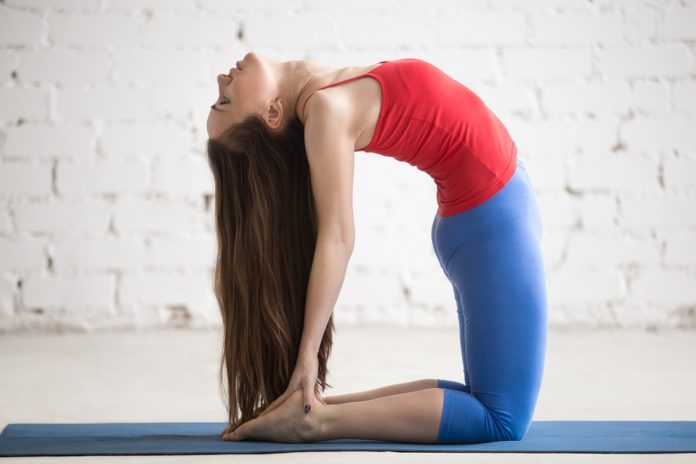“Stand up straight!” If an adult ever gave you this order when you were a child, perhaps poking you between the shoulder blades, that adult knew what they were talking about. Posture affects much more than how we appear to others. It plays a role in how our bodies work, in many different ways. Poor posture can even lead to chronic illness. Improving your posture can improve your health in many ways.
In today’s world, it’s common to spend a minimum of eight hours per day sitting at a desk. As we sit we tend to hunch over and disengage our core muscles. Eventually, aches and pains start to set in. If you work at a desk, you probably know this. But aches and pains are only the beginning.
Posture Affects Digestion
If you suffer from IBS or other digestive issues, your posture may have something to do with it. Journal of PHYSIOLOGICAL ANTHROPOLOGY and Applied Human Science published a 2002 study in which Japanese scientists propose it is unnatural for humans to sit up after eating. Their research suggested that the best way to digest food after a meal is to lie down. In their study, lying down slowed digestion and limited malabsorption. According to their research, continuing to sit up after eating triggers our “fight or flight” mode. Thus, our body spends energy on other parts of our body rather than solely on digesting.
When our bodies slouch for long periods our core muscles get weak. A weak core means the body doesn’t react the way it needs to while digesting food. A relaxed core after eating allows the stomach to expand which helps prevent bloating.
The entire core is affected by this weakness but most predominantly affects our diaphragm, a muscle that separates the chest from the abdomen. A weak diaphragm won’t allow the stomach to expand. This can cause bloating.
Posture Affects Breathing
A strong diaphragm assists not only digestion but also our breathing. Ace Fitness describes the diaphragm as the “only skeletal muscle that is essential for life.” When you inhale, your diaphragm contracts to a flat state. As you exhale it relaxes and returns to a dome-like shape. All the while your rib muscles contract and expand with the diaphragm.
When you don’t practice proper posture your diaphragm isn’t able to contract and relax as it needs to. So, if you suffer from fatigue, pay attention to how you sit and stand. It could be that your fatigue is coming from a lack of oxygen throughout your body.
Posture Affects Muscles
Shoulder, neck, and lower back pain have plagued us since computers have come into everyday use. Many individuals are unaware at how technology has bent our bodies forward. Our bodies are bending in ways that are unnatural and therefore our muscles are taking on a strain that they aren’t built for. So it comes to no surprise that our muscles are suffering due to poor posture.
“Suck in your tummy,” is a phrase that everyone has heard before. But it’s advice that we all should take. Once again this refers to our diaphragm and our core muscle group. As a whole, our population has decreased the usage of our core. Our core comprises the transverse abdominals, multifidus, diaphragm, and pelvic floor. When these muscles get weak, our back, shoulder, and necks are more susceptible to injury and aches.
Posture and Mental Health
The way you hold yourself can even affect how you see yourself. If you look at the ground and slouch while you walk… you look depressed. Odds are that you feel that way too. “Being slumped or hunched over… is a defensive, powerless position.” Says Erik Peper, a Professor of Health Education with San Francisco State University.
Holding your head high and straightening your posture can make you look and feel confident. You will look more confident, too. Then people are more likely to react positively to you, reinforcing that confident feeling!
Poor Posture Leads to Poor Circulation
Crossing one’s legs is a habit that usually starts at a young age. This behavior negatively affects circulation in your lower extremities. It cuts off circulation and can cause varicose veins. So when you sit for long periods keep both feet flat on the floor. If you still feel the need to cross your legs for comfort then cross at the ankles rather than the knees.
Spine and Health also explains that posture can affect the amount of blood that circulates through your body. When you aren’t sitting or standing up straight, your body must work harder to pump blood. This raises your blood pressure. By opening your chest you are allowing more oxygen into your bloodstream and less constraints on your circulatory system, which can effectively lower your blood pressure.
Prevent Future Injuries by Improving Your Posture Now
Odds are, if you’re reading this, you may already suffer from some ill effects of poor posture. My first advice to you is to follow the aforementioned instructions of Dr. Frey. Good posture allows your muscles and joints to work as they should.
Don’t Stand Still For Too Long
Don’t forget to move around, even if you sit or stand with proper posture. Our muscles become tense when we stay in the same position for too long. If you stand for long periods, stretch your arms and legs frequently. Also, shift your weight back slightly and keep your knees from getting stiff. If you have a desk job consider alternatives to sitting like a standing or treadmill desk.
Exercise Your Back
Exercise is also a great place to start. Due to the low impact, Pilates and yoga are a great way to exercise and learn proper posture. Look for other core-strengthening activities like belly dancing, horseback riding, or rucking.
Start at an Early Age
As I stated before, posture is a learned behavior. If you’ve ever rolled your eyes at your mother for telling you to, “straighten up,” you’re not alone. She was trying to teach you a habit that you would carry into adulthood and help prevent injury and chronic pain. Do your own children a favor and instill good posture habits with them at a young age. Teaching them at an early age can save you from feeling like you’re nagging them and save them from a lifetime of joint and muscle pain.
Posture affects every part of your body and many areas of your health. Taking steps to improve your posture can benefit you in many ways, including some you may not have thought of.








I have been diagnosed with IBS in October 2018 and I am 66 year old woman. Never had any problems before this with
My health. I will definitely use the information you gave on posture affects digestion. I am always looking for ways
To improve my health now. Thanks a bunch, Kathy